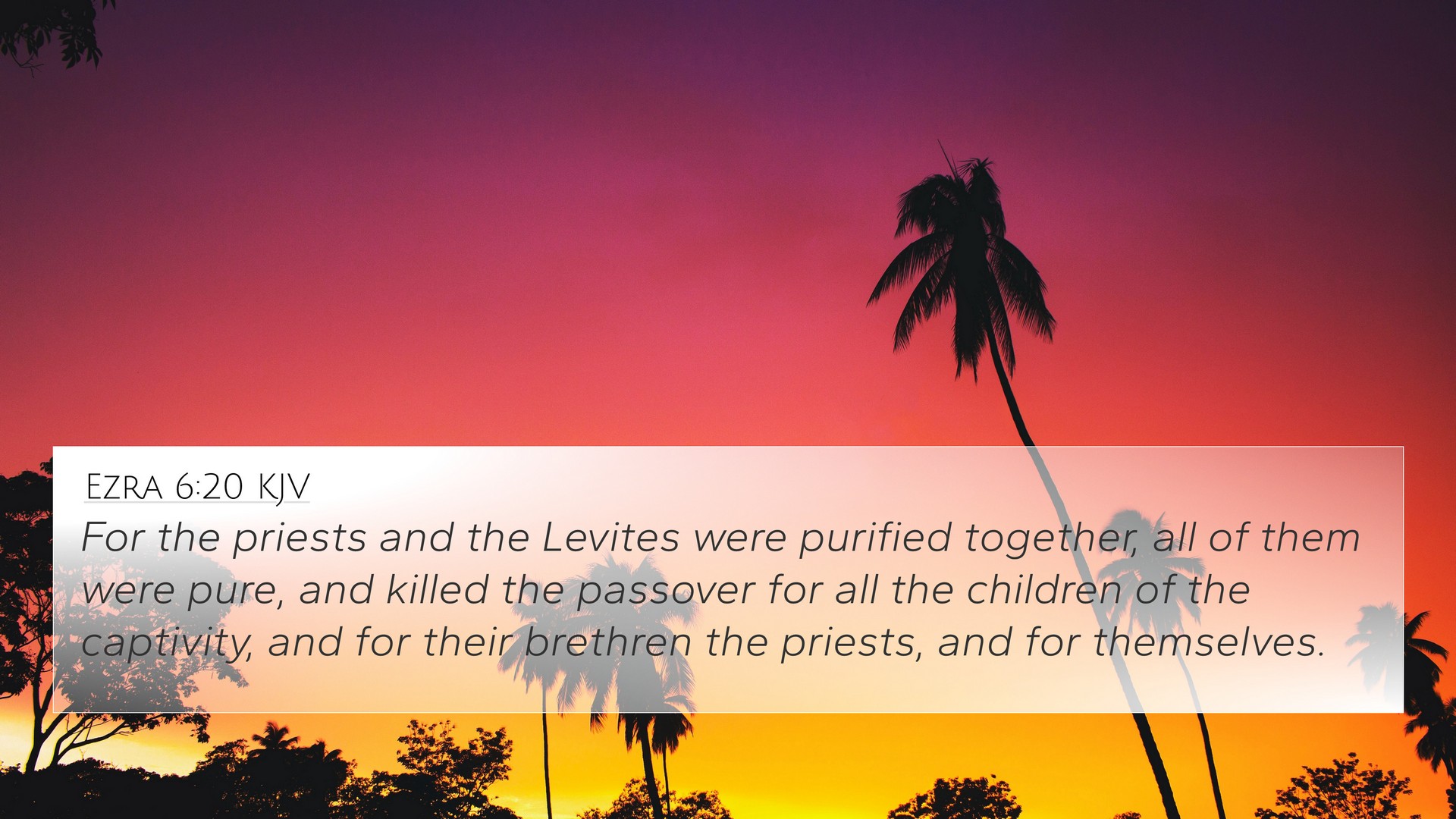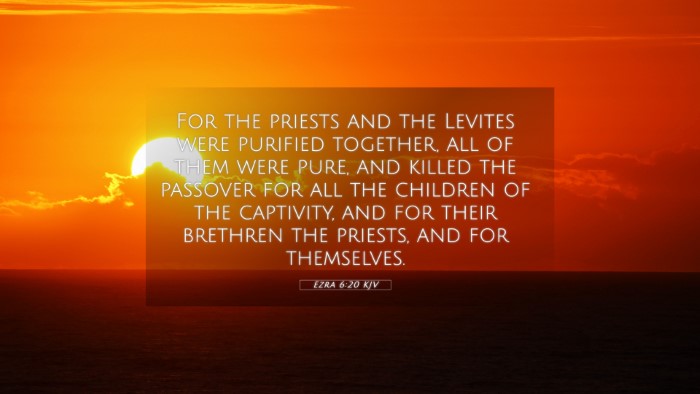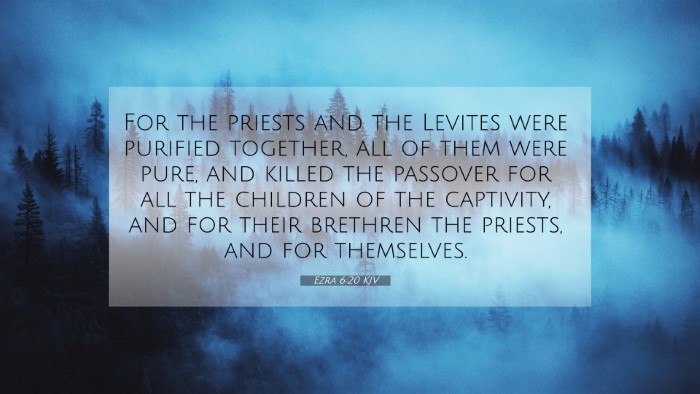Old Testament
Genesis Exodus Leviticus Numbers Deuteronomy Joshua Judges Ruth 1 Samuel 2 Samuel 1 Kings 2 Kings 1 Chronicles 2 Chronicles Ezra Nehemiah Esther Job Psalms Proverbs Ecclesiastes Song of Solomon Isaiah Jeremiah Lamentations Ezekiel Daniel Hosea Joel Amos Obadiah Jonah Micah Nahum Habakkuk Zephaniah Haggai Zechariah MalachiEzra 6:20 Similar Verses
Ezra 6:20 Cross References
For the priests and the Levites were purified together, all of them were pure, and killed the passover for all the children of the captivity, and for their brethren the priests, and for themselves.
Uncover the Rich Themes and Topics of This Bible Verse
Listed below are the Bible themes associated with Ezra 6:20. We invite you to explore each theme to gain deeper insights into the Scriptures.
Ezra 6:20 Cross Reference Verses
This section features a detailed cross-reference designed to enrich your understanding of the Scriptures. Below, you will find carefully selected verses that echo the themes and teachings related to Ezra 6:20 KJV. Click on any image to explore detailed analyses of related Bible verses and uncover deeper theological insights.
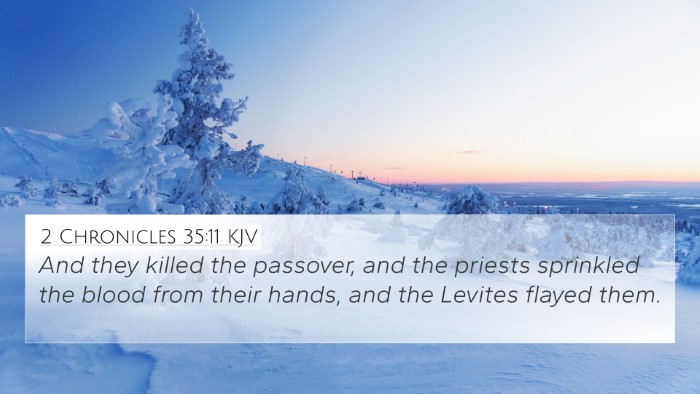
2 Chronicles 35:11 (KJV) »
And they killed the passover, and the priests sprinkled the blood from their hands, and the Levites flayed them.
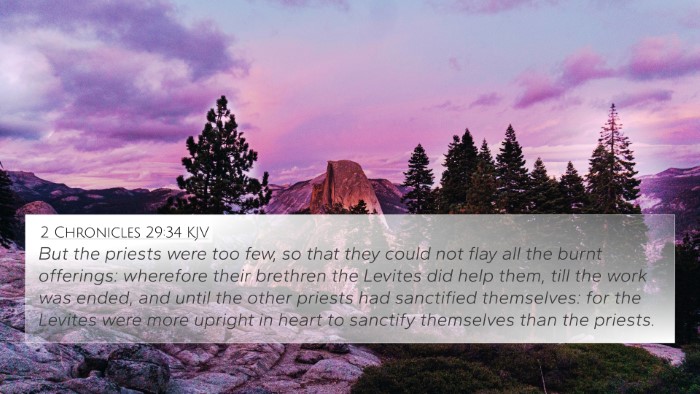
2 Chronicles 29:34 (KJV) »
But the priests were too few, so that they could not flay all the burnt offerings: wherefore their brethren the Levites did help them, till the work was ended, and until the other priests had sanctified themselves: for the Levites were more upright in heart to sanctify themselves than the priests.
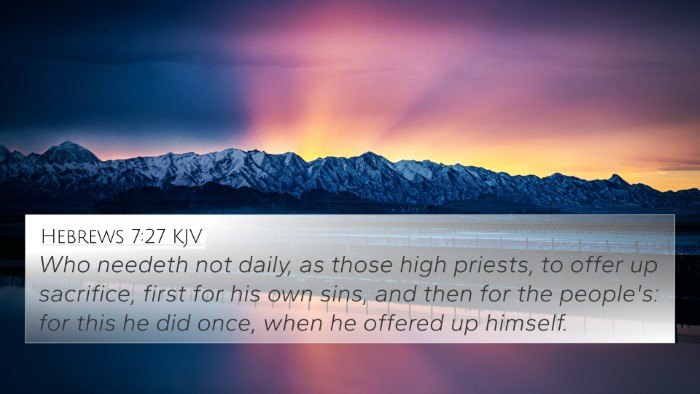
Hebrews 7:27 (KJV) »
Who needeth not daily, as those high priests, to offer up sacrifice, first for his own sins, and then for the people's: for this he did once, when he offered up himself.
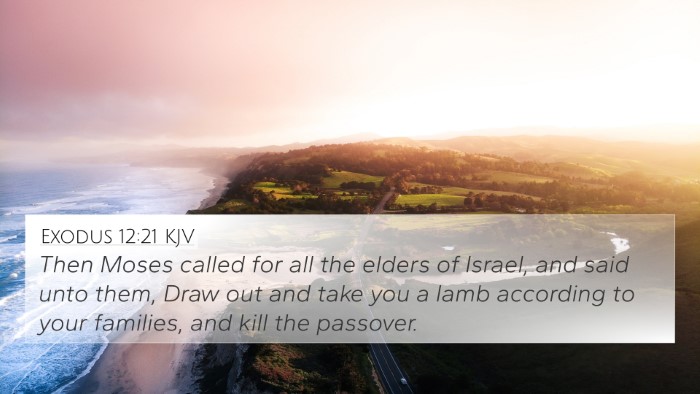
Exodus 12:21 (KJV) »
Then Moses called for all the elders of Israel, and said unto them, Draw out and take you a lamb according to your families, and kill the passover.
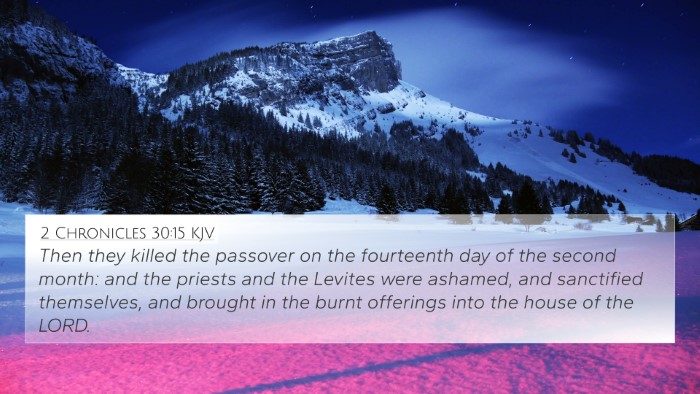
2 Chronicles 30:15 (KJV) »
Then they killed the passover on the fourteenth day of the second month: and the priests and the Levites were ashamed, and sanctified themselves, and brought in the burnt offerings into the house of the LORD.
Ezra 6:20 Verse Analysis and Similar Verses
Understanding Ezra 6:20
Ezra 6:20 states:
"For the priests and the Levites had purified themselves together; all of them were pure, and killed the Passover lamb for all the children of the captivity, and for their brethren the priests, and for themselves."
Context and Background
This verse occurs in the context of the return of the Jewish exiles from Babylonian captivity and the rebuilding of the temple in Jerusalem. The celebration of Passover is significant, as it recalls the Israelites' liberation from Egypt, symbolizing freedom and divine deliverance.
Commentary Insights
Matthew Henry's Commentary
Matthew Henry emphasizes the importance of purification before participating in sacred acts. Here, the priests and Levites purifying themselves underscores their readiness and reverence for the Passover, which is central to Jewish identity and worship. Their collective action conveys unity among the returnees and signifies a new beginning for the community.
Albert Barnes' Notes
Barnes points out that the passage highlights the communal aspect of the Passover celebration. The priests and Levites not only purified themselves for their roles but also provided for the whole congregation, drawing parallels to the communal worship practices in the law. This mutual involvement strengthens the bonds of community in devotion.
Adam Clarke's Commentary
Clarke emphasizes the technicalities involved in the purification process and the ritualistic importance of the Passover lamb. The act of slaying the lamb symbolizes the sacrifice required for atonement, echoing earlier rituals established in the Levitical laws. Clarke connects this to themes of obedience and devotion to God’s commandments.
Key Themes and Reflections
- Purification: The need for spiritual and ritual purity is illustrated as a prerequisite for worship.
- Community and Unity: The collective participation of priests and Levites reflects the significance of communal worship.
- Deliverance and Redemption: The Passover symbolizes God's redemptive work, which parallels the bigger theme of liberation in the Bible.
- Obedience to God's Laws: The emphasis on following the commandments aligns with the overarching biblical narrative of faithfulness.
Cross-Referencing Related Verses
Ezra 6:20 connects to various Bible verses that illustrate similar themes:
- Exodus 12:21-27: Details the institution of the Passover.
- Leviticus 23:5: Highlights the timing and significance of the Passover feast.
- Numbers 9:2-5: Discusses the observance of Passover in the wilderness.
- 2 Chronicles 30:13-20: Describes a successful Passover celebration under King Hezekiah, emphasizing unity and purification.
- Luke 22:15: Jesus expresses His desire to eat the Passover with His disciples, linking Old Testament themes to New Testament fulfillment.
- John 1:29: John the Baptist identifies Jesus as the Lamb of God, reinforcing sacrificial imagery.
- 1 Corinthians 5:7: Paul correlates Christ to the Passover lamb, indicating the fulfillment of this theme in New Testament theology.
Thematic Connections Across Scripture
- Redemption: Both the Passover and Christ's sacrifice illustrate God's work of redemption.
- Purity: The principle of being pure before God transcends both testaments and speaks to the heart of worship.
- Community Worship: Consistent thread seen in communal observances throughout the Bible.
Tools for Cross-Referencing
To explore such connections, one may use various biblical study tools, such as:
- Bible concordance
- Bible cross-reference guide
- Bible study applications focusing on inter-Biblical dialogue
Encouragement for Further Study
Engaging with cross-references enriches the understanding of scripture, revealing deeper connections and implications of the text. For those delving into a comparative Bible verse analysis, consider how different themes resonate through various scripts, thus enhancing personal insight and reflection. Look into:
- Identifying cross-references efficiently using tools designed for that purpose.
- How to find thematic connections across scripture.
- Exploring detailed cross-references that link both Old and New Testament teachings.
Conclusion
Ezra 6:20 stands as a pivotal moment demonstrating the significance of purification, communal worship, and the foundational themes of devotion to God. By connecting this verse with others, one can appreciate the rich tapestry of Biblical narrative that continuously points toward redemption and God's faithfulness.
